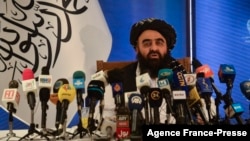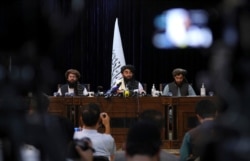Ask almost any senior Taliban official if there is press freedom in Afghanistan, and you'll get a ready answer.
“Without a doubt,” said Zabihullah Mujahid, the Taliban’s top spokesman and deputy minister of information and culture.
“Reporters can write and publish anything that is factual and not a mere accusation. We don’t have any problem with them.”
That’s what Mujahid told VOA. But it’s far from the whole story.
Since seizing power in mid-August, the Taliban have pursued a two-pronged media strategy, projecting a press-friendly image to the outside world by holding regular press conferences, while clamping down, sometimes by force, on a once vibrant media.
Although they’ve stopped short of shutting down privately owned news outlets or instituting outright censorship, Taliban officials have issued restrictions so sweeping that many outlets have had no choice but to drop critical programming and self-censor.
The Taliban’s so-called “11 rules of journalism” prohibit publishing or broadcasting reports that are “contrary to Islam” and “distort news content,” and discourage reporting news that has not been officially confirmed. A more recent directive requires that the media refer to the Taliban by their official name: Islamic Emirate of Afghanistan.
In a report last week, Human Rights Watch said that the Taliban rules are “so broad and vague as to prohibit virtually any critical reporting about the Taliban.”
The effect on substantive journalism has been crippling. Gone are popular satire shows that skewered officials, replaced by religious programming favored by the Taliban. With anchors in exile or in hiding from the Taliban, TV guests parry soft-ball questions from less experienced presenters. Stories that took on religious extremism have all but vanished, local reporters say.
“Everything has changed,” said Kabul-based journalist Eshaq Ali Ehsas. “There are no critical programs on radio and TV. Print media publish fewer critical articles. This is the clearest sign of censorship.”
The repression has hit hardest in the provinces. There, away from the international spotlight, Taliban commanders have been put in charge of local “departments of information and culture” that oversee local media.
Although their policies vary from province to province, reporters say any criticism of the group can bring a warning or worse.
“For example, reporting that the Taliban haven’t given women their rights is banned,” a veteran reporter based in the remote Farah province, said via messaging app. “Similarly, you can’t report that the Taliban don’t let girls go to school,” the journalist said.
VOA granted anonymity to protect the reporter’s safety.
Journalists are allowed to cover bread-and-butter issues such as high food prices. But first, they must obtain permission from the local department of information and culture.
“Without consultation and guidance from the Department of Information and Culture, you can’t publish or broadcast anything,” the Farah reporter said.
In Mazar-i Sharif, one of Afghanistan's largest cities, the Taliban’s information and culture chief ordered local reporters to submit stories along with a list of questions and interview subjects for approval before publication, according to several local journalists.
“If the director likes it, he'll say, go ahead and cover it," said a long-time Mazar-i Sharif reporter working for a national TV network. "If it rubs him the wrong way, he'll say no."
Because of the risk of retaliation, VOA granted the reporter anonymity.
Stories about a recent shipment of medical supplies from Pakistan and a Shiite religious ceremony were OK’d, the reporter said, but not protests by local doctors and women’s rights activists. The Taliban have outlawed all public demonstrations, though they continue in some areas.
“Not only were we not allowed to cover the women’s protest, but several reporters were also beaten up,” the reporter said.
Spokesperson Mujahid denied asking local officials to require journalists to obtain pre-approval for stories, and instead blamed it on the officials’ inexperience.
“Some of the directors are serving in an acting capacity,” he said. “They’re also new on their jobs. They need training. We’ll introduce them to the media afterwards.”
Mujahid did not respond a question about whether the Taliban were investigating reported threats against journalists.
For the Afghan media, the Taliban system of control has been a shattering change.
“These things did not exist in our laws,” said Danish Karokhel, the founder and chief executive of Pajhwok Afghan News, Afghanistan’s leading wire service, referring to the Taliban requirement that reporters run everything by them.
Afghanistan’s 2004 Constitution enshrined the right “to print and publish on subjects without prior submission to state authorities.” Additionally, the country’s media law included a requirement to comply with international norms, something that is missing from the Taliban’s media rules.
At Pajhwok, editors have instructed reporters to document everything prior to filing and to always seek out comment from Taliban officials, Karokhel told VOA.
“If we don’t document it, our fear is that they might use it against us,” Karokhel said.
Others have taken more drastic measures. After local Taliban officials demanded that reporters turn in their reports for vetting, editors at Salam Watandar, the country’s largest network of independent radio stations, decided to shun Taliban-related content.
“We’ve tried not to broadcast any reports about the Taliban, certainly not news in which they represent one side of the story,” said Shahhussain Rasuli, chief editor at Salam Watandar.
Though the environment remains hostile, media freedom advocates in Afghanistan say there are indications that some Taliban officials have eased off.
“In recent days, a number of provincial reporters have told me they’ve noticed an improvement in the situation,” said Hujatullah Mujadidi, vice president of the Afghanistan Independent Journalists Association.
Mujadidi said his meetings with Mujahid and other Taliban officials have given him reason to be optimistic.
“Whenever I bring up these issues with the (Taliban’s) cultural commission and ministry of information and culture, they say they’re not against criticism because criticism brings reform,” Mujadidi said.
Yet the Taliban press conferences have done little to inspire confidence among media members who see themselves under assault.
Since coming to power, the Taliban have detained at least 32 journalists, several of whom were beaten in custody last month, according to Human Rights Watch.
Basir Ebadi, a reporter who has attended three Taliban press conferences, says that journalists can’t freely ask questions.
“I’m very worried about the future of the media and freedom of expression in Afghanistan,” Ebadi said. “At the moment, the Taliban are in the spotlight but as soon as the world’s attention turns away from Afghanistan, they’re going to institute new restrictions in the name of Islamic law and no one will have freedom of expression.”






